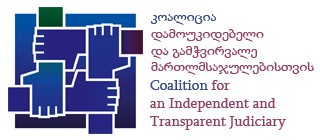


 The September 2015 amendments to the Law on Prosecutor’s Office have changed procedures for the appointment of Prosecutor General. The amendments introduced Prosecutorial Council consisting of 15 members including Minister of Justice, 2 Parliament Members, 2 common court judges, 2 representatives of the academia, and 8 prosecutors. The Council has been endowed with an important role in the selection and appointment of Prosecutor General. The amendments also introduced Prosecutors Assembly, which includes all prosecutors and investigators working for the Prosecutor’s Office. The Assembly is responsible for the election of 8 members of the Prosecutorial Council.
The September 2015 amendments to the Law on Prosecutor’s Office have changed procedures for the appointment of Prosecutor General. The amendments introduced Prosecutorial Council consisting of 15 members including Minister of Justice, 2 Parliament Members, 2 common court judges, 2 representatives of the academia, and 8 prosecutors. The Council has been endowed with an important role in the selection and appointment of Prosecutor General. The amendments also introduced Prosecutors Assembly, which includes all prosecutors and investigators working for the Prosecutor’s Office. The Assembly is responsible for the election of 8 members of the Prosecutorial Council.
The Coalition positively assessed the fact of introduction of Prosecutorial Council and Prosecutors Assembly as collegial bodies representing prosecutors. We hope that this novelty will serve as a mechanism for increasing independence of the Prosecutor’s Office and empowering individual prosecutors with an aim to create an accountable and trustworthy Prosecutorial System.
With this statement the Coalition responds to the first conference of the Prosecutors Assembly which took place on October 19-21. The conference elected 8 members of the Prosecutorial Council.
It needs to be noted that a significant part of the election process took place beyond the scope of the Prosecutors Assembly. More specifically, observers did not have an opportunity to monitor:
The Law on the Prosecutor’s Office or the Prosecutors Assembly bylaws do not provide rules for how the groups responsible for nominating candidates are created, how they make decisions regarding specific nominations, and based on which procedure the Administrative Committee is created. Therefore, various procedural issues are unclear. The above issues were decided in the absence of the Prosecutors Assembly bylaws which at the time were not supported and approved. Thus, it is unclear whether the internal selection processes were democratic and fair.
The conference itself was well organized and open to representatives of media and observing organizations. However, the closed nature of the process which led to the nomination of 17 candidates by 12 groups did compromise elections.
We need to note that the existing law does not provide flexible mechanisms which would allow individual nominations by prosecutors. The right to nominate a candidate is a prerogative of groups including at least 30 individuals, which can nominate 2 candidates at maximum. In view of the fact that the number of prosecutors and investigators is limited and each of them is allowed to be a member of one group only, the Prosecutors’ Assembly may face a problem of an insufficient number of nominating groups or an insufficient number of candidates as a result of which the Assembly’s choices will be limited.
The process of composition of Prosecutorial Council has not been finalized and it is important to ensure selection of the remaining 6 members in accordance with transparent and democratic procedures. It is also crucial to ensure that selected candidates enjoy a high degree of public trust.
The Coalition continues to monitor the processes which take place within the Prosecutorial system. It needs to be reiterated that despite amendments to the rules for the selection of Prosecutor General, the problem of ensuring full political neutrality of Prosecutor’s Office is still acute. In order to address this challenge it is still important to carry out additional legislative changes in this direction. The Coalition is ready for partnerships with an aim of planning further reforms.